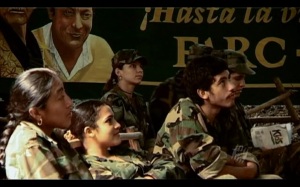Director: Frank Poulsen
This documentary details the decision by a young woman named Isabel to join the Revolutionary Armed Forces of Colombia (FARC). Isabel comes from a university background and decided to join the FARC because of what she felt was increased political repression in the city. She comes from what is clearly a more privileged background than many of the fighters in the FARC and that privilege shows up throughout various points in the documentary (for example, she seems for a while unable to limit her bathing time to what is supposed to be allocated for everyone). Although she comes from a more comfortable background, it is made clear that her father has been involved in Left wing politics, and that she was also involved when she was in the university.
The film is not necessarily a political take on the FARC but instead aims to focus on the “up close and personal” details of new recruits to the militant group. There are some minor jabs at the group, for example there is text in the documentary that talks about how joining the FARC is a life time commitment, meant to make it a sort of scary notion. But for the most part, the way the more controversial aspects of the FARC are dealt with in the film are through a dialogue between Isabel and some of the commanders/teachers in her unit. For example, she brings up the conceptions of the FARC’s involvement in drug trade, to which the FARC commander denies, and later in the film points to the fact that the FARC has been trying to encourage other crop growth based on food, not coca. These are issues that James J. Brittain addresses in his book Revolutionary Social Change in Colombia: The origin and direction of the FARC-EP.
On top of the interestingly “neutral” or “non-political” take on the FARC and the war in Colombia, the film has excellent cinematography. This more artistic take on the subject is an excellent way to shed light on an issue that many folks don’t know much about, and documentaries and news stories on the subject tend to be static and “uninteresting” to those not already interested in the content.
The film is of interest because it shows what it’s really like to join a self described Marxist-Leninist guerrilla group, and one of the more notorious ones of Latin America. It doesn’t quite address, through statistics and arguments, the conceptions and criticisms that many on the Left have of the group directly. But as was mentioned earlier, seeing the group through the eyes of a new recruit does shed some light on the organization.



You must be logged in to post a comment.